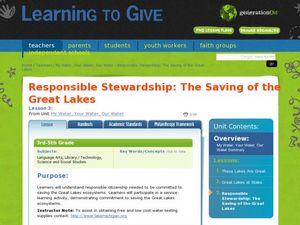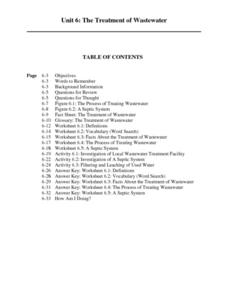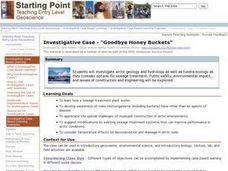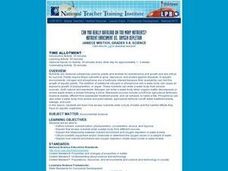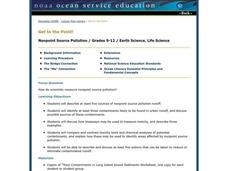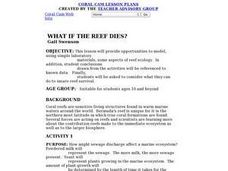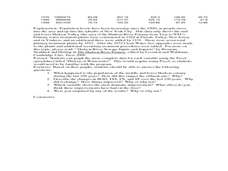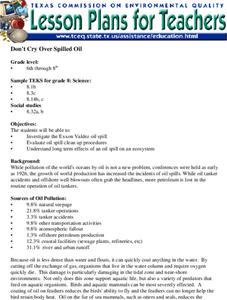Curated OER
What Are We?
Students describe different types of water pollutants. They complete experiments in which they observe the affects of water pollution on algae. They also brainstorm and list three causes of each water pollutant.
Curated OER
Week 3: Pollution Source and Effects
Lab groups set up an experiment to observe what happens over time in collected pond water when fertilizer, representing pollution, is added. This website does not include student lab sheets, but background information, materials, and...
Curated OER
Science and Technology
Eighth graders explore the roles of science and technology in today's world. They research a topic based on the uses of science in society. Students discuss medicine, power, transportation, water and sewage treatment and stereos, TVs....
Curated OER
Pollution and Marine Life
In this pollution and marine life worksheet, students use 9 given terms related to types of pollution and ocean food chains to complete sentences. Students number the effects of human sewage and soil runoff that harm ocean organisms in...
Curated OER
Waste Not, Want Not
Students consider the types of debris that litters beaches and conduct research on waste management. They then interview professionals in a particular field of waste management and write reports for a booklet about garbage and sewage to...
Curated OER
Choices Make A Difference
Students are explained that wastewater treatment plants are regulated as to the quality of water they may discharge into our rivers and canals. They are explained that wastewater treatment plants clean many pollutants out of the...
Curated OER
Then and Now, A Watershed in San Francisco
Learners compare recent and historic maps to explore landscape changes. Using photos provided, students identify prominent features on the maps. They discuss differences in landscape, human impact on watershed, and changes in natural...
Curated OER
Responsible Stewardship: The Saving of the Great Lakes
Students devise a plan to protect the Great Lakes. In this environmental lesson, students conduct research to identify nonprofit groups that help protect the waterways. Students write letters to the Congressman or a nonprofit...
Curated OER
The Treatment of Wastewater
Students, through a series of lessons, study the various processes of treating wastewater. They participate in discussion and complete various worksheets and a hands-on activity, in which they observe the processes of filtration and...
Curated OER
Environment: Methane Sources
Students discover how human activity is increasing the release of methane gas into the atmosphere. Woring in groups, they visit the Eduzone Website and complete worksheets. Students identify the natural and human causes of methane gas.
Curated OER
An Underwater Sediment Slide?
Students explore the proximity of the Hudson Shelf Valley and the Hudson Canyon to one of the Nation's most populated areas. They study that from 1987 to 1992, two dumpsites in the Hudson Shelf Valley and Hudson Canyon, one 12 miles
Curated OER
The Dead Zone: A Marine Horror Story
Students graph dissolved oxygen versus depth using data taken from NECOP Program. For this marine science lesson, students explain the causes of hypoxia. They recommend possible solutions to this problem.
Curated OER
Goodbye Honey Buckets
Learners investigate arctic geology and hydrology as well as tundra ecology as they consider options for sewage treatment. Public safety, environmental impact, and issues of construction and engineering be explored.
Curated OER
Nutrient Enrichment vs. Oxygen Depletion
Pupils investigate how excess nutrients enter a body of water, and the harmful effects they have on aquatic organisms.
Curated OER
Biocomplexity Lab Activity: Measuring Turbidity
Students measure turbidity and comprehend the effects of turbidity on aquatic life. They explain what a lake looks like after a heavy rainfall. Students comprehend that turbidity is a measure of the relative clarity of water.
Curated OER
Dirty Mud
Students examine geological information to study benthic marine habitats. For this watershed project, students examine wetland habitats and land uses in a watershed. They will use geological information to discuss the impact of pollution...
Curated OER
Get to the Point!
Students write out sources of pollution and identify contaminants are most likely found in urban runoff. In this pollution lesson students compare toxicity tests and chemical analysis of potential contaminants.
Curated OER
What If the Reef Dies?
Learners complete four activities to investigate how reef ecology can change. They perform experiments to show how sewage discharge can affect a marine ecosystem, look at substances that don't dissolve in water, examine wave action...
Curated OER
What Does Waste Do to a River?
Young scholars develop a graphic way of visualizing the concept of a million by utilizing what had happened to the Nashua River due to the dumping of raw sewage in 1962.
Curated OER
Ocean Pollution
Young scholars study their role in eliminating ocean pollution and helping keep the oceans clean. In this environmental issues lesson, students define pollution and brainstorm examples of ocean pollution. Young scholars define...
Curated OER
Historical Pollution in the Hudson: Part 2
Ninth graders practice how to format and enter data into an Excel spreadsheet, make a graph, and interpret graphed data. They recognize how the pollution in the Hudson River has changed over time, and explain the consequences of these...
Japan Society
Nature and the Environment in Postwar Japan
Japan has a complex relationship with the environment. Explore this relationship with your class through this resource. Included are thought questions, several activity ideas that range from writing, to discussion, to research, and an...
Curated OER
Don't Cry Over Spilled Oil
Students study the Exxon Valdez Oil Spill while evaluating oil spill clean up activities. They discover the long term impact can have on an ecosystem by completing this experiment.
Curated OER
Not Just a Fish Tank
Learners learn about a specific species of fish, study the effects of outside substances on the reproductive development of a fish, and explore the process of a wastewater treatment facility.









